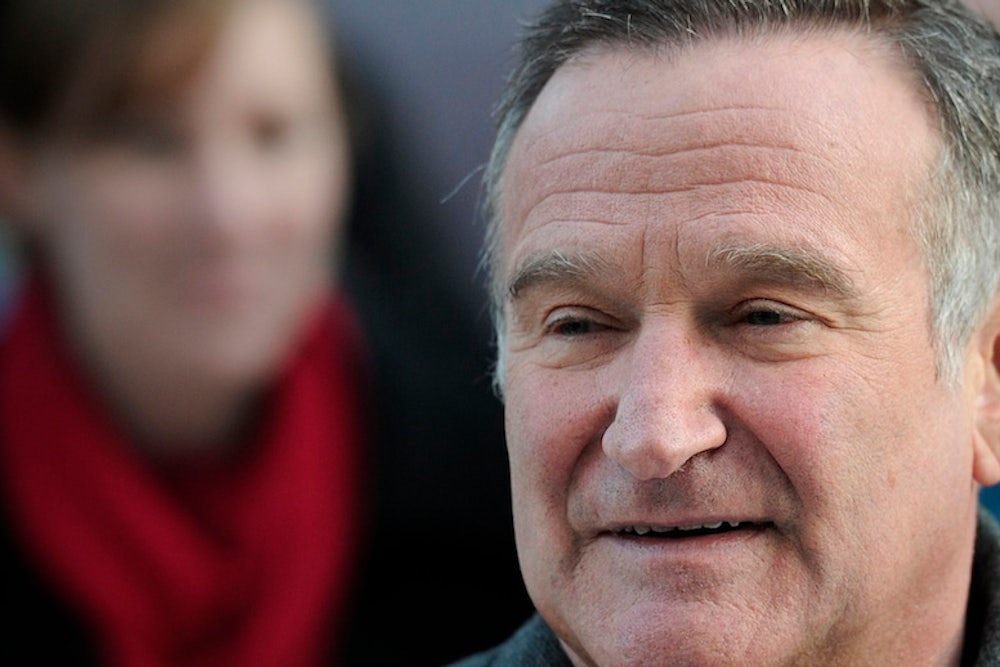Robin Williams’s wife, Susan Schneider, revealed Thursday that her husband was suffering from the early stages of Parkinson’s disease when he committed suicide earlier this week. Williams’s death has drawn much-needed attention to depression and addiction—both of which the actor struggled with—and Schneider’s disclosure is now prompting speculation over whether Parkinson’s played a role in Williams’s decision to end his life. But though a diagnosis of Parkinson’s—a progressive neurological disorder that can cause shaking, muscle rigidity and speech problems in the initial stages, and eventually dementia and even early death—can be devastating, the link between Parkinson’s and suicide is tenuous. Parkinson’s patients probably are more likely to experience depression, but researchers don’t agree on whether or not they’re more prone to taking their own lives.
At least one study suggests they are. In 2010, a team of Serbian doctors at the School of Medicine in Belgrade followed 102 Parkinson’s patients—who turned up to their own outpatient clinic during a four-month period in 2000—for eight years, checking in with them and their caregivers annually. During this period, two of the patients committed suicide: A 73-year-old man who had been living with Parkinson’s for ten years, and a 71-year-old woman who’d had it for twelve. (Both had also been diagnosed with depression.) Though this is obviously a small sample, the researchers calculated that the Parkinson’s patients’ suicide rate was 5.3 times the expected rate for a demographically similar non-Parkinson’s population. They also found a high incidence of death ideation: 22.7 percent of patients scored high on a quiz consisting of questions like, “Has there been a time in the last month when you felt life was not worth living?” and “Has there been a time in the last month that you wished you were dead?”
A 2001 paper in the Journal of Geriatric Psychiatry and Neurology, however, found that rates of suicide among Parkinson’s patients were actually lower than those in the population at large. A team of doctors analyzed six years of mortality data drawn from the U.S.’s National Center of Health Statistics between 1991 and 1996. Looking at the health profiles and causes of death of over 12 million people, the researchers were able to identify 144,364 people with a primary diagnosis of Parkinson’s. Of these, 122 died of suicide, putting the suicide rate for Parkinson’s patients at 0.08 percent—ten times less than the 0.8 percent suicide rate of people in the sample without Parkinson’s. The authors admit they were surprised by this result, and don’t offer a particularly convincing explanation for the paradox. They consider—and dismiss—demographic variables like race and education. Perhaps, they hypothesize, Parkinson’s patients lack the dexterity requisite for most methods of suicide: “Some patients with PD may be uniquely disabled in executing complex cued actions and producing self-initiated, cognitively generated movements.” And the suicide rate doesn’t reflect suicide attempts or death wishes: "The rate of suicidal ideation might be higher than the rate of completed suicides might show.” This is supported by their finding that the rate of depression diagnoses among non-suicidal Parkinson’s patients was more than three times that of the non-suicidal general population.
Yet another study found that suicide rates among Parkinson’s patients were practically indistinguishable from those in the general population. A 1994 paper in the Scandinavian medical journal Acta Psychiatrica Scandinavica looked at 458 Parkinson’s patients in the Danish county of Fyn, who’d been admitted to the Odense University Hospital. A team of doctors, led by Elsebeth Stenager of the University of Southern Denmark, tracked the patients until over half—254—had passed away. During this time, two women committed suicide. (Women comprised 51 percent of the original pool.) If this population were perfectly representative of the Danish at large, 1.62 suicides would be expected. We don't know what was going through Robin Williams's head on Monday, and it's natural to try to search for a rationale—but it would be simplistic to pinpoint Parkinson's as the culprit.
